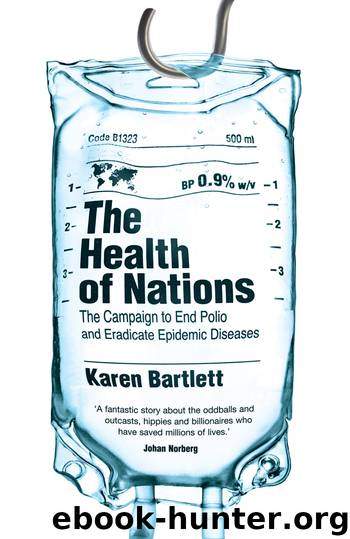The Health of Nations by Karen Bartlett

Author:Karen Bartlett
Language: eng
Format: epub
ISBN: 9781786070692
Publisher: Oneworld Publications
Published: 2017-04-10T04:00:00+00:00
The birth of microbiology
Bacteria had been seen through microscopes since 1676, when the Dutchman, Antonie van Leeuwenhoek, first observed living organisms smaller than the single-celled animals (protozoa) he had seen in lake water. For more than fifty years, Leeuwenhoek wrote to the Royal Society in London about his discoveries, describing the microscopic organisms as ‘mightily diverting’, in the way they ‘pulled their bodies and tails together, continuing their gentle motion’. A few years later, Herman Boerhaave, who was born in Leiden in 1668, argued that smallpox was caused by an infectious agent, not invisible poisons found in swampy air. Boerhaave is now considered the founder of clinical teaching and the modern teaching hospital but in his assertions about smallpox he was ahead of his time.
Limited progress was made until the 1870s, when the development of the compound microscope and high-quality lenses revealed living agents associated with numerous diseases, including typhoid, cholera, leprosy, tuberculosis and diphtheria. Scientists could now see the infectious microbes they worked with and they immediately tried to develop vaccines. Ferdinand J. Cohn published an early classification of bacteria in 1875, using the word ‘bacillus’ for the first time. The following year, working under Cohn’s auspices, Robert Koch, who would become Germany’s leading bacteriologist, published a paper on his work with anthrax, which identified a bacterium as the cause of the disease.
The first method for isolating a pure culture of bacteria was developed two years later, in 1878, by Joseph Lister (who later applied Pasteur’s germ theory and became known as the father of antiseptic surgery) when he demonstrated the specific cause for the lactic fermentation of milk. This was the beginning of a flurry of microbiological discoveries; among the most well-known of which is the work of the French chemist, Louis Pasteur.
Born in the Jura region of eastern France, Pasteur was the son of a tanner, who grew up overlooking the stinking tanning pits. After gaining a doctorate from the École Normale in Paris, Pasteur was eventually appointed professor of chemistry at the University of Lille. Here, his academic research was intended to benefit local industries including vinegar production and wine-making. Pasteur famously proved that liquids such as beer and milk went off because of the rapid multiplication of micro-organisms within them, and that heating the liquids to boiling point killed the micro-organisms. He went on to develop the technique of ‘pasteurization’ for preserving liquids.
Pasteur pursued his germ theory, applying his observations to solid matter. He won a prize from the French Academy of Sciences for demonstrating that the decay of meat was also caused by microbes. Based on his theory, Pasteur believed that disease in the body could be caused by a similar multiplication of microbes, or ‘germs’. Pasteur studied chicken cholera in his laboratory, injecting chickens with the live bacteria and recording the fatal progression of the illness. His discovery that chickens were immune to cholera germs that had been left exposed to the air was made by accident: an assistant forgot to inject the chickens with a fresh batch of culture before he left for a month’s holiday.
Download
This site does not store any files on its server. We only index and link to content provided by other sites. Please contact the content providers to delete copyright contents if any and email us, we'll remove relevant links or contents immediately.
Vaccine Epidemic by Louise Kuo Habakus(1665)
The Vaccine Race by Meredith Wadman(1660)
The Vaccine Court by Rohde Wayne(1512)
On Immunity: An Inoculation by Biss Eula(1364)
The End of Breast Cancer by Kathleen T. Ruddy MD(1304)
Pox by Michael Willrich(1249)
How to End the Autism Epidemic by J.B. Handley(1193)
Children's Medicines by Edward A. Bell(1178)
The Speckled Monster by Jennifer Lee Carrell(1155)
Vaccine Epidemic: How Corporate Greed, Biased Science, and Coercive Government Threaten Our Human Rights, Our Health, and Our Children by Louise Kuo Habakus(1149)
The Health of Nations by Karen Bartlett(1141)
The Official Autism 101 Manual by Karen L. Simmons(1107)
Vaccines: A Reappraisal by Moskowitz Richard(1096)
Vaccine Injuries: Documented Adverse Reactions to Vaccines by Lou Conte Tony Lyons(1084)
Vaccines Did Not Cause Rachel's Autism by Peter J. Hotez(1070)
Arrowsmith (1925) by Sinclair Lewis(1030)
The Vaccine Debate by Tish Davidson(1004)
Understanding Hepatitis by Naheed Ali(925)
Callous Disregard: Autism and Vaccines: The Truth Behind a Tragedy [2010] by !!! Andrew J. Wakefield(908)
